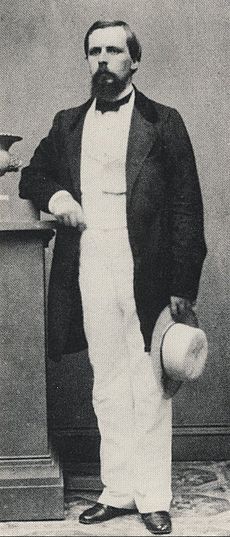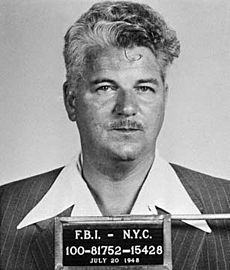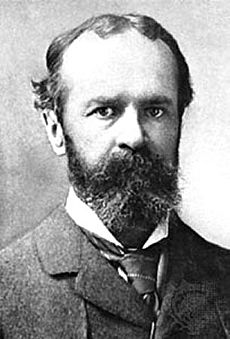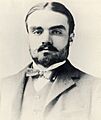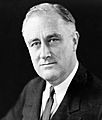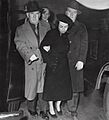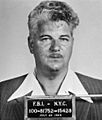Learned Hand facts for kids
Quick facts for kids
Learned Hand
|
|
|---|---|
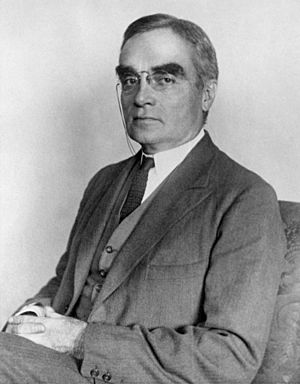 |
|
| Senior Judge of the United States Court of Appeals for the Second Circuit | |
| In office June 1, 1951 – August 18, 1961 |
|
| Chief Judge of the United States Court of Appeals for the Second Circuit | |
| In office September 1, 1948 – June 1, 1951 |
|
| Preceded by | Office established |
| Succeeded by | Thomas Walter Swan |
| Judge of the United States Court of Appeals for the Second Circuit | |
| In office December 20, 1924 – June 1, 1951 |
|
| Appointed by | Calvin Coolidge |
| Preceded by | Julius Marshuetz Mayer |
| Succeeded by | Harold Medina |
| Judge of the United States District Court for the Southern District of New York | |
| In office April 26, 1909 – December 29, 1924 |
|
| Appointed by | William Howard Taft |
| Preceded by | Seat established by 35 Stat. 685 |
| Succeeded by | Thomas D. Thacher |
| Personal details | |
| Born |
Billings Learned Hand
January 27, 1872 Albany, New York, U.S. |
| Died | August 18, 1961 (aged 89) New York City, New York, U.S. |
| Political party |
|
| Spouse | Frances Amelia Fincke |
| Children | 3 |
| Parent |
|
| Relatives |
|
| Education | Harvard University (AB, LLB) |
Billings Learned Hand (January 27, 1872 – August 18, 1961) was a very important American judge and legal thinker. He worked as a federal trial judge in New York City from 1909 to 1924. Then, he became a federal appeals judge for the United States Court of Appeals for the Second Circuit from 1924 to 1951.
Learned Hand was born and grew up in Albany, New York. He studied philosophy at Harvard College and then graduated with high honors from Harvard Law School. After working as a lawyer for a while, he became a federal judge at age 37. He was very good at his job, and his decisions were known for being clear and strong.
Many people admired Hand's writing style. He became famous outside the legal world in 1944 during World War II. He gave a speech in Central Park about tolerance and freedom that many people loved. At a time when many Americans were afraid of people trying to secretly harm the country, Hand was seen as someone who protected civil liberties (the rights and freedoms of citizens). A book of his speeches, The Spirit of Liberty, became very popular.
Hand also helped create new ways to understand laws. His decisions in areas like patents (rights for inventions), torts (cases about harm or injury), and antitrust law (laws to prevent monopolies) set high standards. He believed in protecting free speech and in strong laws to solve social problems. He thought that courts should not easily overturn laws made by elected officials, except in very special cases. As of 2004, more legal experts and the Supreme Court of the United States had quoted Learned Hand than any other lower-court judge.
Contents
Early Life and Education
Learned Hand was born on January 27, 1872, in Albany, New York. He was the second child of Samuel Hand and Lydia Hand. His family was well-known and had a history of being involved in the Democratic Party. The Hands were a very important legal family in New York.
Samuel Hand was a successful lawyer who argued many cases in appeals courts. Learned Hand found his father to be a distant figure. Samuel Hand died when Learned was 14. After his father's death, Learned's mother often talked about her husband's success, which put a lot of pressure on her son.
Lydia Hand was a very caring mother. She taught Learned a strong sense of duty. Learned Hand later realized how much his parents shaped him. After his father died, he felt very anxious and unsure of himself. He later said he was "very undecided, always have been—a very insecure person, very fearful." He also didn't like his first names, "Billings" and "Learned," because he thought they didn't sound strong enough. In 1899, he stopped using "Billings."
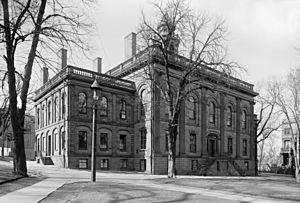
Hand went to The Albany Academy for ten years. He didn't enjoy the school's teaching or its focus on Ancient Greek and Latin. He felt like an outsider at school. However, his summers in Elizabethtown were much happier. There, he became lifelong friends with his cousin, Augustus Noble Hand. They loved camping and hiking in nature. After his father's death, Hand felt more pressure to do well in school. He graduated near the top of his class and was accepted into Harvard College.
College Years at Harvard
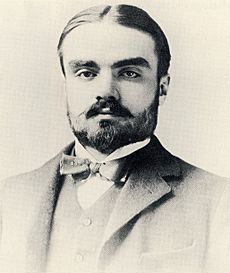
Learned Hand started at Harvard College in 1889. At first, he studied classical subjects and math. But in his second year, he changed to philosophy and economics. He studied with famous thinkers like William James and George Santayana.
Hand found it hard to fit in socially at Harvard at first. He wasn't chosen for the popular social clubs. He later described himself as a "serious boy" who worked hard. In his later years, he became more social. He was elected president of The Harvard Advocate, a student magazine.
Hand was a very good student and was chosen for Phi Beta Kappa, a group for top students. He graduated with the highest honors in 1893. His family expected him to study law. Even though he thought about studying philosophy more, he decided to go to law school.
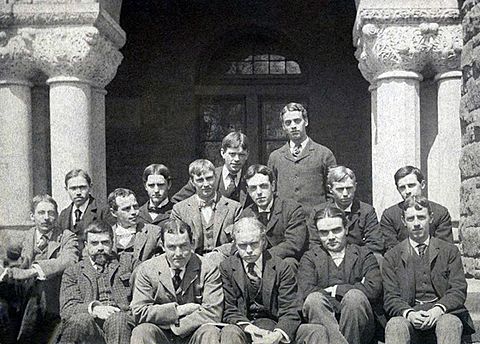
Hand's three years at Harvard Law School were exciting. He lived with other law students who became close friends. They studied hard and discussed philosophy and books. Hand was chosen as an editor for the Harvard Law Review, but he left to focus on his studies.
His favorite professor was James Bradley Thayer, who taught him about constitutional law. Thayer greatly influenced Hand's ideas about law. He taught that courts should be careful and not overstep their power when deciding social issues.
Starting His Legal Career
Hand graduated from Harvard Law School in 1896. He moved back to Albany to live with his mother and aunt and started working at a law firm. He found the work boring and struggled to get his own clients. He spent a lot of time researching and writing, but he wanted to do more work in appeals courts. His early court appearances were difficult, and he worried he wasn't good enough.
By 1900, Hand was unhappy with his job. He started writing scholarly articles and teaching part-time to find more interesting work. He also became interested in politics. Even though his family were Democrats, he voted for Republican Theodore Roosevelt for governor in 1898. He also registered as a Republican for the 1900 presidential election. He felt he needed to move to New York City for better opportunities.
Marriage and Move to New York City
In 1901, Hand met Frances Fincke during a summer vacation. He proposed to her a few weeks later. They married on December 6, 1902, after Hand found a job at a law firm in Manhattan. They had three daughters: Mary, Frances, and Constance. Hand was often worried as a husband and father.
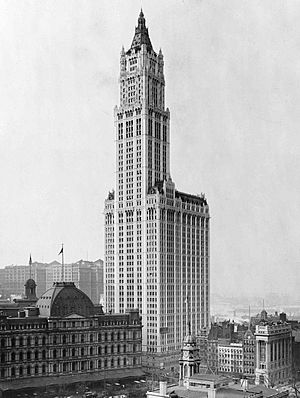
The family spent summers in Mount Kisco and later in Cornish, New Hampshire, which was a popular place for writers and artists. The Hands bought a house there in 1919. Because Cornish was far from New York City, Hand could only join his family for vacations. Frances Hand spent a lot of time with a friend, Louis Dow, which caused some tension in their marriage. Hand eventually accepted his wife's need to spend time in the country.
In 1908, Hand became good friends with political writer Herbert Croly. Croly's ideas about a stronger national government greatly influenced Theodore Roosevelt's political views.
Hand was still not happy with his law career. He felt he wasn't good at it. In 1907, he decided to try for a new federal judgeship in New York City. With help from a friend, he got the support of President William Howard Taft. In April 1909, at age 37, Learned Hand became one of the youngest federal judges ever appointed.
A Federal Judge's Work
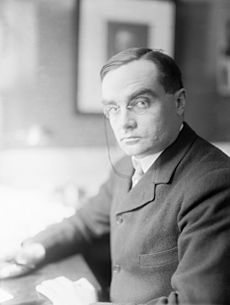
Learned Hand served as a federal district judge in New York from 1909 to 1924. He handled many different types of cases, including those about torts (civil wrongs), contracts, and patents. At first, he was anxious because he wasn't familiar with some of these areas. He found cases about bankruptcy boring, but he was fascinated by patent law.
Hand made important decisions about free speech. He was also involved in politics, supporting Theodore Roosevelt's ideas for reform. He wanted laws to help people who were struggling and to control large companies. In 1912, Roosevelt formed the Progressive Party, and Hand joined him. Hand even ran for chief judge of the New York Court of Appeals in 1913, but he lost. He later regretted running for office while being a judge.
By 1916, Hand realized the Progressive Party wouldn't last. He then started writing for The New Republic, a liberal magazine. He wrote articles about social reform and judicial power. When the United States entered World War I in 1917, Hand thought about leaving his judge job to help with the war effort, but he didn't.
Free Speech and World War I
Hand made a very important decision during the war in 1917 in a case called Masses Publishing Co. v. Patten. Congress had passed a law making it a crime to hinder the war effort. The post office stopped delivering a magazine called The Masses because it criticized the government's decision to go to war.
Judge Hand ruled that the magazine should be allowed to be sent through the mail. He said that unless the magazine's words directly told people to break the law, their free speech should be protected. This idea, called the "incitement test," was new and brave. However, Hand's decision was quickly overturned by a higher court.
Hand always believed his ruling was correct. He tried to convince Supreme Court Justice Oliver Wendell Holmes, Jr. of his argument. Even though it took time, Holmes later changed his views on free speech, partly because of Hand's ideas. Many years later, in 1969, the Supreme Court used a similar idea to Hand's "incitement test" in a case, showing how important his early decision was for free speech in America.
Hand knew that ruling against the government might hurt his chances of being promoted. He wanted to become a judge on the United States Court of Appeals for the Second Circuit, but his Masses decision and his reputation as a liberal worked against him.
Between the World Wars
In 1924, President Calvin Coolidge appointed Hand to the Second Circuit Court of Appeals. This showed how much Hand's reputation had grown. In 1926 and 1927, his court became even stronger with the addition of Thomas Walter Swan and Hand's cousin, Augustus Noble Hand.
After the Progressive Party ended, Hand stayed out of party politics. He believed judges should be fair and not take sides, even though he had strong political views. He continued to support free speech and was worried about any signs of "Red-baiting" (unfairly accusing people of being Communists). For example, in 1920, he supported the New York Governor's decision to stop laws that would have banned five elected Socialist Party lawmakers from taking their seats. In 1922, he privately disagreed with a plan to limit the number of Jewish students at Harvard.
Hand became known for his impressive speeches, which earned him respect from legal experts and journalists. By 1930, he was considered a strong candidate for a seat on the Supreme Court. His friend Felix Frankfurter strongly supported him. However, President Herbert Hoover chose someone else, possibly because Hand was from New York, and there were already two New Yorkers on the Supreme Court.
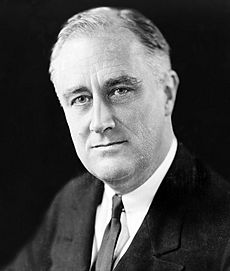
Hand voted for Hoover in 1928 and 1932. But in 1936, he voted for Franklin D. Roosevelt and the Democrats. This was because of the economic problems after the stock market crash of 1929. Hand believed the government needed to step in to help the economy. Roosevelt promised a "New Deal" to help the country recover. Hand voted for Roosevelt again in 1940 and 1944. However, he was still careful about the dangers of too much government power. He strongly criticized Roosevelt's plan in 1937 to add more judges to the Supreme Court.
Hand often had to judge cases related to the many new laws of the New Deal. These cases often involved figuring out the line between the power of the central government and local laws. In 1935, Hand and his colleagues ruled that a New York poultry company did not break a New Deal law because it only traded within its state. Hand wrote that judges must "put into concrete form what that will is, not by slavishly following the words, but by trying honestly to say what was the underlying purpose expressed."
World War II and Public Fame
When World War II started in Europe in 1939, Learned Hand believed the United States should not stay out of the conflict. In February 1939, he became the senior judge of his court, which was like being the chief judge. He focused on keeping good relationships with other judges and making sure the court was fair. Under Hand, the Second Circuit became known as one of the best appeals courts in American history.
In 1942, Hand's friends again tried to get him appointed to the Supreme Court, but President Roosevelt did not choose him. Roosevelt said it was because of Hand's age, but there might have been other reasons, like Hand's different ideas about law or pressure from his friends. Hand was disappointed but later regretted wanting the job so much.
Hand was glad when the United States entered the war in December 1941. He supported programs for Greece and Russia. He also supported Roosevelt in the 1944 election, partly because he worried about the country becoming isolated again. Hand was concerned about investigations into "subversive activities" (secret actions against the government) by government workers. He also disagreed with the Nuremberg war-crimes trials after the war, seeing them as revenge rather than true justice.
Learned Hand became famous to the public after a short speech he gave in 1944. On May 21, 1944, he spoke to over a million people in Central Park at an event for new American citizens. He said that all Americans were immigrants who came seeking liberty. He explained that liberty is not found in laws or courts, but "in the hearts of the people."
In the most famous part of his speech, Hand asked: "What then is the spirit of liberty? I cannot define it; I can only tell you my own faith. The spirit of liberty is the spirit which is not too sure that it is right; the spirit of liberty is the spirit which seeks to understand the minds of other men and women; the spirit of liberty is the spirit which weighs their interests alongside its own without bias; the spirit of liberty remembers that not even a sparrow falls to earth unheeded; the spirit of liberty is the spirit of Him who, near two thousand years ago, taught mankind that lesson it has never learned, but has never quite forgotten; that there may be a kingdom where the least shall be heard and considered side by side with the greatest."
Parts of his speech were printed in The New Yorker, The New York Times, Life, and Reader's Digest. Hand's message that everyday Americans protect liberty became very popular, and he became a folk hero. Even though he enjoyed the praise, he felt he didn't deserve it.
Later Years and Legacy
Learned Hand's 75th birthday in 1947 was widely celebrated. People called him the best American judge. Hand remained humble. He continued his work as a judge and stayed involved in political issues. In 1947, he spoke against a law that would have banned criticizing racial or minority groups. He argued that such a law would make intolerance worse.
The Cold War and McCarthyism
After World War II, Hand was worried about the Cold War and the spread of Communism. But he was also concerned about the "hysterical fear" of Communism at home. He disliked the anti-Communist campaign led by Senator Joseph McCarthy, known as McCarthyism. Hand expressed his horror of McCarthyism privately because cases related to it might come before his court.
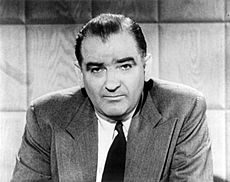
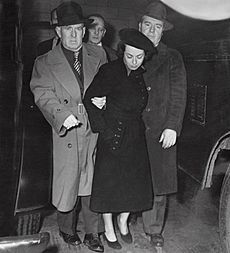
Only after he stepped down as a full-time judge in 1951 did Hand speak out publicly against McCarthyism. He gave a speech that was published in The Washington Post, an anti-McCarthy newspaper. Hand said that a society where people suspect each other of being traitors cannot survive. He stressed the importance of demanding proof and judging fairly. He also said that truth can only be found when it is carefully examined.
He followed this with another speech the next year, again attacking McCarthyism. Hand voted for Dwight D. Eisenhower in the 1952 election and believed Eisenhower helped bring about McCarthy's downfall.
Semi-retirement and Death
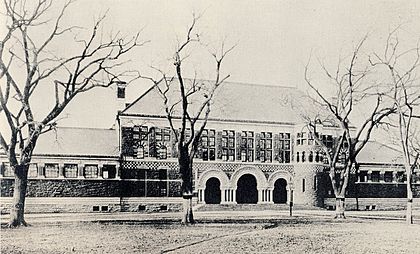
In 1951, Hand retired from his full-time judge position but continued to work as a senior judge, taking on many cases. The next year, he published The Spirit of Liberty, the book of his speeches. It received great reviews, sold well, and made him even more famous.
Hand's wife, Frances, died in 1944. After this, their marriage became much happier. Hand believed his wife had saved him from being a "melancholic, a failure."
Former law clerks who worked for Hand shared details about his personality. He was very careful with public money, often turning off lights in offices at the end of the day. He was also known for his quick temper and sarcasm. Despite these outbursts, Hand was always very unsure of himself. Even in his 80s, he still worried about not being accepted by elite social clubs at Harvard.
Learned Hand stayed in good physical and mental shape for most of his last ten years. The author of The Catcher in the Rye, J. D. Salinger, became his neighbor and close friend in Cornish, New Hampshire.
By 1958, Hand was in a lot of pain from his back and had trouble walking. He eventually needed to use crutches, but he remained mentally sharp and continued to hear cases. In 1960, he worked briefly on a commission for President Eisenhower but resigned due to his health.
By June 1961, Hand was in a wheelchair. He joked that he felt lazy because he had only worked on about 25 cases that year. The next month, he had a heart attack and died peacefully on August 18, 1961. The New York Times published an obituary on its front page. The Times of London wrote that many people felt that with Learned Hand's death, "the golden age of the American judiciary has come to an end."
He was buried next to his wife in Albany Rural Cemetery in New York. His grandson was the actor Richard Jordan.
Learned Hand's Influence
Learned Hand wrote about 4,000 legal opinions during his career. These opinions were admired for being clear and precise. They have been quoted more often by the Supreme Court and legal experts than those of any other lower-court judge. Hand's important decision in United States v. Aluminum Company of America in 1945 helped shape antitrust law (laws about fair business competition). His decisions in patent, copyright, and admiralty law (laws about the sea) cases also helped develop those areas of law.
Hand was also a founder of the American Law Institute. There, he helped create the important Restatements of the Law, which are like guides for improving state laws in different areas.
On his 75th birthday in 1947, The Washington Post wrote that he was known as "a judges' judge." His opinions were respected everywhere because of his clear thinking and strong reasoning.
Images for kids


